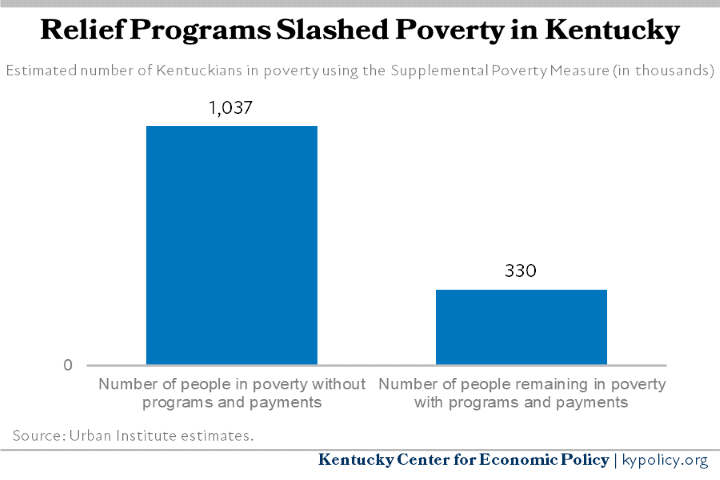Thanks to many programs enacted through COVID-related federal relief legislation, an estimated 707,000 fewer Kentuckians are living in poverty in 2021 than they would have otherwise — a reduction of 68%. This finding comes from a recent report by the Urban Institute that estimates Kentucky’s Supplemental Poverty Measure (or SPM, which is different from the Official Poverty Measure) in 2021 is just 7.6% with various assistance programs and direct payments, compared to 23.9% without them.

The Urban Institute estimated what the poverty rate would be this year in each state with and without 11 anti-poverty programs — some of which were COVID-related and some that were not. Without these programs, the Urban Institute estimates that the share of Kentuckians living in poverty would have risen from 21.7% in 2018 to 23.9% in 2021. But the 11 programs and payments instead led to a large decline in the poverty rate.
Of the programs the authors accounted for, the two most recent rounds of stimulus checks, the Supplemental Nutrition Assistance Program (SNAP) and its COVID-related expansion, and unemployment benefits including their pandemic expansions were responsible for the majority of the poverty reduction at the national level. Children throughout the country experienced the largest poverty reduction — dropping from a poverty rate of 30.1% without the past year’s programs and payments to 5.6% with them. When applied to national-level poverty rates by race and ethnicity, Black Americans experienced the largest estimated decline in poverty because of these programs — falling from 36.0% to 9.2% because of the various federal programs.
Kentuckians have experienced significant hardship throughout the pandemic and economic downturn. But this report shows federal relief legislation passed in March and December of 2020, and especially the American Rescue Plan Act of 2021, significantly mitigated that hardship. Unfortunately, many of the anti-poverty provisions in those plans will either expire soon, or are set to expire in the coming year. Boosted unemployment benefits, enhanced SNAP benefits and the improved Child Tax Credit all need to be permanent, or else much of the recent decline in poverty will reverse.
Additionally, the federal relief and other anti-poverty programs have shown that federal spending directly on food, energy and housing assistance, as well as direct cash payments, can be transformational. With the American Families and Jobs Plans, we have an opportunity to build on those successes, permanently cut poverty and improve opportunity in the United States and Kentucky — but only if Congress chooses to enact them.



